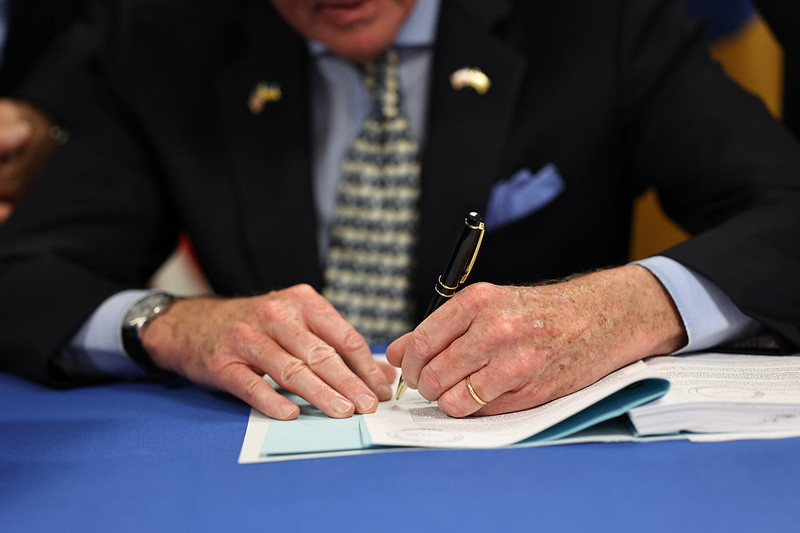States
Murphy Bill To End Student Criminalization And Improve School Safety

Murphy Bill To End Student Criminalization:
Congresswoman Ayanna Pressley (MA-07) and Senator Chris Murphy introduced the Counseling Not Criminalization in Schools Act, a pioneering K-12 education reform bill. Ending school over-policing, which disproportionately affects children of color, LGBTQ+ students, and students with disabilities, the measure promotes safe and supportive schools.
The Act aims to transfer federal monies from school policing to mental health experts due to emerging evidence of its negative impacts. The $5 billion funding initiative will employ counselors, social workers, and school psychologists and conduct trauma-informed and school climate-improvement programs.
Congresswoman Pressley stressed the need to interrupt the school-to-confinement pipeline and hire culturally appropriate support workers. Senator Murphy agreed, emphasizing the necessity of a supportive learning environment for all pupils. Representative Ilhan Omar and Senator Elizabeth Warren have supported schools as educational and employment avenues rather than prisons.
Many educational equality and social justice advocacy groups support the measure. The American Civil Liberties Union (ACLU), National Education Association, GLSEN, and others support the initiative, demonstrating its necessity.
Congresswoman Pressley has previously supported the Ending PUSHOUT Act, which would prohibit the punitive expulsion of girls of color from schools. Along with her continued efforts, Pressley has sought a GAO investigation on the K-12 pushout epidemic, emphasizing the need for comprehensive education reform.
In a February 2022 House Education and Labor Subcommittee hearing, Congresswoman Pressley raised worries about the pandemic’s effects on juvenile mental health and the school pushout epidemic.
Disproportionate Impact And Educational Racism Prevention
Racism has permeated K-12 education by targeting and criminalizing Black pupils, reinforcing structural inequality. Congresswoman Ayanna Pressley and Senator Chris Murphy introduced the Counseling Not Criminalization in Schools Act, a critical step toward tackling this widespread problem. By moving federal dollars from school police presence, the law attempts to end discriminatory practices that have long supported the school-to-confinement pipeline, especially for Black pupils. The $5 billion planned for counselors, social workers, and other trauma-informed staff shows a commitment to helping all kids, regardless of race or background. This legislation is a significant step toward ending educational and racial inequality and highlighting the need for structural change and assistance for vulnerable groups.
Read Also: Racism: California Has Become The First State To Address Reparations For Its Black Residents.
Raising Voices And Forming Alliances For Educational Equity
Many advocacy groups and organizations fighting racial prejudice have endorsed the Counseling Not Criminalization in Schools Act. With the ACLU, GLSEN, and the National Education Association as major proponents, educational fairness and justice resonate across. These organizations recognize the intersectionality of racial discrimination and educational access and have called for systemic racism to be addressed in educational institutions and policies that prioritize students’ holistic well-being, especially those from historically marginalized communities. The bill’s overwhelming support shows the rising momentum for racial justice and equality in schools and the importance of collaboration in removing structural obstacles and creating inclusive learning environments.
Key Legislation And The Racial Equality Movement
Congresswoman Ayanna Pressley’s efforts to reintroduce the Ending PUSHOUT Act and call for a GAO study on the K-12 pushout crisis demonstrate her commitment to addressing systemic racism in education.
These landmark bills highlight the need for comprehensive changes that emphasize Black kids’ well-being and educational success, challenging the existing quo and campaigning for anti-discrimination measures. Representative Pressley’s passionate advocacy and regular engagement with stakeholders demonstrate legislative leaders’ vital role in amplifying disadvantaged voices and promoting significant change. These programs inspire community action to tackle education racism and inequality in the face of the pandemic and growing educational gaps.
Promoting Inclusive Learning And Empowering Marginalized Communities
The Counseling Not Criminalization in Schools Act emphasizes structural transformation and inclusive learning settings that empower vulnerable groups. The proposal highlights the need for specialized assistance for students who have historically encountered structural impediments to academic performance by arguing for reallocating federal monies to counselors, social workers, and trauma-informed staff. This emphasis on inclusiveness and empowerment marks a significant change in education, emphasizing the role of mental health specialists and support personnel in creating a feeling of belonging and security in schools. The bill promotes diversity, holistic development, and comprehensive support programs for all students, regardless of race or socioeconomic status, through culturally responsive practices.
Intersectionality And The Holistic Approach To Education Racial Disparities
The Counseling Not Criminalization in Schools Act addresses the complex issues encountered by Black kids and other oppressed groups by taking a comprehensive approach to racial inequities in education. The law recognizes the link between systematic racism, mental health, and education by promoting trauma-informed treatment and professional development. Intersectionality emphasizes the need for comprehensive support systems that address social, emotional, and intellectual well-being, reflecting a paradigm change in educational racial inequalities. The bill promotes equity and social justice in education through an intersectional approach that addresses diverse student needs.
Long-term Advocacy And Community Engagement Catalyze Change.
The Counseling, Not Criminalization in Schools Act’s continued campaigning and community participation demonstrate the power of persistent activism to alter laws. The bill’s support from grassroots to national advocacy groups shows how community-driven efforts can elevate disadvantaged voices and change policy. Through grassroots campaigns, public demonstrations, and strategic partnerships, activists and community leaders have garnered widespread support for the bill, emphasizing the importance of centering the voices of those most affected by systemic racism and discrimination. This prolonged activism raises awareness of the need to eradicate racial gaps in education and fosters a feeling of communal duty and solidarity for educational fairness and social justice. These joint projects demonstrate the endurance and drive of communities working to create a more fair and inclusive educational environment as the transformational change movement progresses.













You must be logged in to post a comment Login